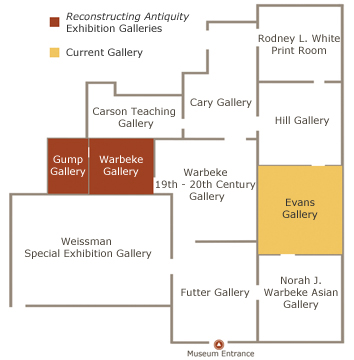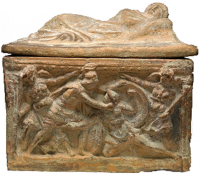Scene from Aeschylus’ "Seven Against Thebes", with Eteocles, son of Oedipus, attacking his brother Polynices; figure of the deceased reclining on top
Learn more about the object below
Aeschylus was the oldest of the three great Athenian tragedians. While his plays often took their stories from the archaic tradition—such as the story of Oedipus’s cursed sons Polynices and Eteocles—the playwright reworked them for presentation before the 5th-century BCE Athenian audience. Because Athens at that time was a direct democracy, it was critical that citizens develop abilities to focus attention on problems of collective life. At its best, tragedy did just that—helping citizens to think by drawing them in through the action, and stoking their emotion and reason. Fifth-century tragedy thus helped constitute the political understandings of the audience, providing a space for spectators to develop the habits of mind necessary for democratic citizenship.
This cinerary urn illustrates the fraternal battle between Polynices and Eteocles, whose story actually begins with their father, the infamous Oedipus. When Oedipus realizes he has killed his father and married his own mother, he gouges out his eyes and curses his sons (who are also his half-brothers). The sons are meant to take turns ruling his former kingdom of Thebes, but as tragedy has it, the arrangement doesn’t work out. The brothers soon find themselves at war with one another, each believing himself to have the rightful claim to the throne. Their battle brings many themes to mind—equality, fate, choice, patriotism. In the end, the brothers die at one another’s hands and the struggle finds resolution only through their equality in death.
In a city where political equality was fiercely prized, death became another reminder of humanity’s ultimate equality. Aeschylus’s presentation of the story of Eteocles and Polynices reminded Athenians of this simple truth. Like the brothers, fifth-century Athenians often struggled with questions of justice—what is owed to whom? Has the distribution been fair? Who is equal to whom? While 2nd-century Etruscan civilization offered a radically different political context, it seems likely that questions of equality remained, especially given the choice of themes illustrated on this urn. Certainly, the display of wealth that often accompanied funeral rites would provide one response to such questions. But the inclusion of this urn is a different sort of answer—a reminder that when it comes to our mortality, we are all equal.
Label texts by Elizabeth Markovitz, Assistant Professor of Politics, Mount Holyoke College.
Suggested readings:
Balot, Ryan. Greek Political Thought. Malden, MA: Blackwell, 2006.
Easterling, P. J. The Cambridge Companion to Greek Tragedy. New York: Cambridge University Press, 1997.
Euben, Peter. The Tragedy of Political Theory. Princeton: Princeton University Press, 1990.
Nussbaum, Martha. The Fragility of Goodness: Luck and Ethics in Greek Tragedy and Philosophy Cambridge: Cambridge University Press, 1986.
Sommerstein, Alan, eds. Aeschylus: I. Cambridge, MA: Loeb Classical Library.
Vernant, Jean-Pierre. The Origins of Greek Thought. Ithaca: Cornell University Press, 1982.


